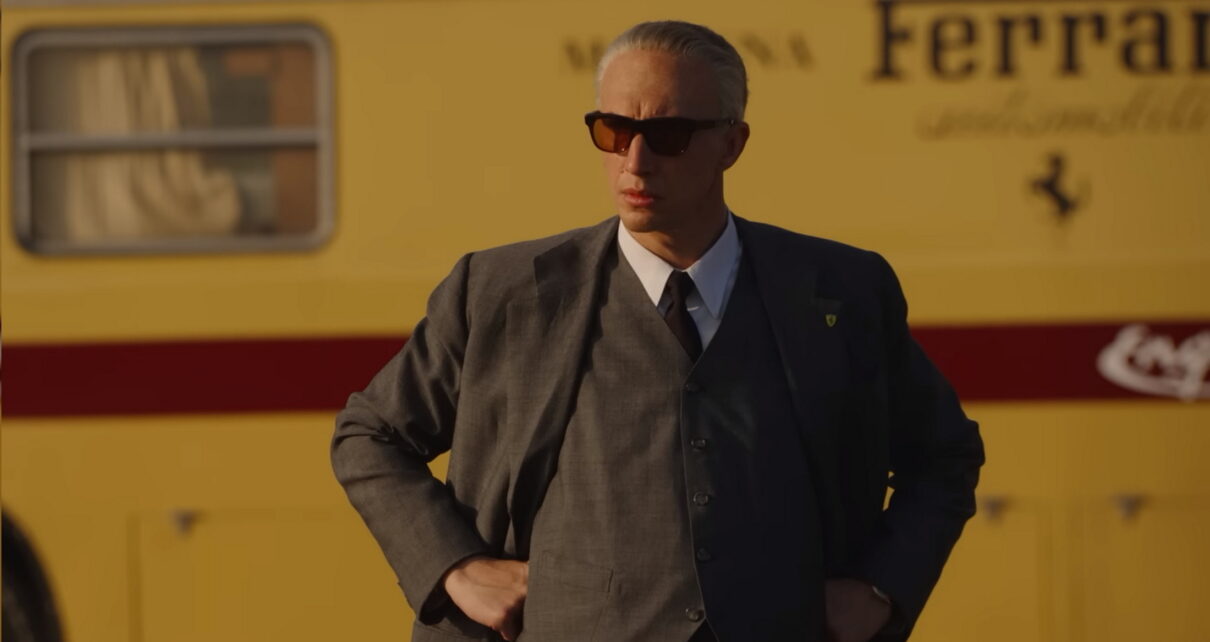It takes almost two hours to figure out why this film was made. Halfway through, I looked up the Mille Miglia (“Thousand Miles”) Italian auto race. Huh, they stopped having them in 1957. Wait. Doesn’t this film take place in 1957?
It does.
Are those two thoughts related?
They are.
By 1957, Enzo Ferrari (Adam Driver) was 59 years old. He was decades past his driving prime, decades past his founding of his sports car racing empire, decades past the mechanical designing that would gain him notoriety, and even well past some of the lesser-known but significant points in his history, like WWII and his taking of a lover (Shailene Woodley). By 1957, Enzo Ferrari had an angry wife (Penélope Cruz) and a world-famous company going out of business because “he sold cars to race” and not the other way around, like that punk, Maserati.
For a full hour, Ferrari tries to sell us on two minor plots, neither of which turns out to be relevant to much of anything. The first involves Enzo Ferrari’s infidelity, which his wife knew about, occasionally cared about, and used for leverage. She was Enzo’s business partner, after all. The second involved the health of the Ferrari company, deeply in the red in 1957. Enzo Ferrari had no desire to make the necessary moves to keep the business afloat, like sell cars or get a partner.
I’m not a fan of either of these plots because during the film, Enzo Ferrari makes zero (0) quality moves and, yet, doesn’t either get divorced or lose the company. So, ummmm, movie, are we still presenting these plots as genuine controversies? I honestly don’t get it. I feel like you’re filling time because the real plot point takes about eight seconds.
A third and genuinely resonating plot eventually surfaces regarding Enzo Ferrari’s callousness. We see this early on when one of the Ferrari drivers attempts to break a speed record and instead dies in a horrible wreck. Within one minute of the death, Enzo Ferrari blames the accident “on [the driver’s] mother.” Oh, I see, this is our film: is Ferrari diabolical … or just an asshole? Whatever, there’s now an opening in Team Ferrari. You’ll regret taking advantage of that one, kid.
What comes across loud-and-clear in the film is Enzo’s love of cars and racing. It’s a shame he couldn’t marry a racecar, cuz he would. And he’d be truer to that marriage. Maybe he should speak to the Titane people. The most touching personal scene with the man is not when he’s with his wife, not when he’s with his mistress, but with their child discussing … auto design. Ferrari concludes, “When a thing works better, it is usually more beautiful to the eye.” I dunno if this was his philosophy on life, but it sure sounds it, huh?
most touching personal scene with the man is not when he’s with his wife, not when he’s with his mistress, but with their child discussing … auto design. Ferrari concludes, “When a thing works better, it is usually more beautiful to the eye.” I dunno if this was his philosophy on life, but it sure sounds it, huh?
All of this is screen-writing hooey. The film is constantly awaiting the one big scene ten minutes before the end credits. And the scene not only negates most of what occurred previous; the fallout eliminates two full plots. I don’t know where you were going with those anyway, Michael Mann.
80% of Ferrari feels like the viewer walked in on the second act. “Wait. Who’s that? Is this important? What did I miss?” Trust me; you didn’t miss a thing. Mann is a skilled director, so Ferrari is the product of a professional, but it is not the product of somebody who had a clear point to make, just somebody who wanted one (1) great and terrible scene.
There once was a man named Ferrari
Who made a super speedy autocar-i
But his business declined
Cuz the man was resigned
To compete in lieu of a vending safari
Rated R, 130 Minutes
Director: Michael Mann
Writer: Troy Kennedy Martin, Brock Yates
Genre: Why was this movie made … ? Oh. That’s why.
Type of being most likely to enjoy this film: Historical racing enthusiasts (?)
Type of being least likely to enjoy this film: People who think Ferrari should have gone out of business … and they’re not wrong.



